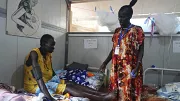In South Sudan, where maternal mortality rates are among the highest in the world, midwives face an uphill battle to save lives. Elizabeth Nyachiew, a midwife supervisor with Médecins Sans Frontières (MSF), has experienced these challenges firsthand.
Recalling the difficulty of working without essential medical equipment, she expressed the deep frustration of watching patients suffer and even die due to the lack of resources. “It is very challenging, being a midwife and seeing someone who is dying and you could not help because you don’t have equipment,” Nyachiew said.
Nyachiew’s commitment to becoming a midwife was born out of tragedy. At 16, she witnessed her neighbor bleed to death during childbirth in northern South Sudan. This harrowing experience motivated her to take action, leading her to pursue a career in midwifery. Now 36 and a mother of five, she has navigated war, hunger, displacement, and personal health crises to fulfill her mission of helping other women.
South Sudan has one of the highest maternal mortality rates globally, with an estimated 1,200 women dying per 100,000 live births, according to the United Nations. This alarming figure represents a more than 50% increase from five years earlier. The causes of these deaths are numerous, including a lack of access to medical care, basic necessities like clean water and sanitation, and a severe shortage of trained healthcare staff.
The situation is further exacerbated by the country’s poor infrastructure. With much of South Sudan lacking a proper road network, pregnant women often have to endure long, painful journeys to reach the nearest clinic. Some walk for hours or days, while others are transported in wheelbarrows or stretchers by relatives. Even those who manage to reach a clinic may not receive the care they need.
Nyalith Mauit, who recently lost one of her twins during childbirth, is a stark example of these grim realities. She delivered her babies in a facility near Bentiu, but complications arose when one of the twins was in a breech position. Despite being transferred to an MSF clinic, one of her babies could not be saved. “I am grateful that there is a hospital here. If there wasn’t, yesterday could have been the end of my life,” Mauit said, holding her surviving newborn.
Stephanie Marriott, a midwifery manager with MSF, highlighted the many barriers women face in accessing maternity care in South Sudan. These include financial difficulties, transportation challenges due to poor road conditions or flooding, and non-functional health facilities. The ongoing violence and displacement further complicate access to care, leaving millions reliant on humanitarian aid.
South Sudan is still grappling with the aftermath of a civil war that killed nearly 400,000 people and displaced millions. Although a peace deal has improved access to aid, health experts warn that much more needs to be done to address the healthcare crisis. With elections postponed to December and continuing violence in some regions, the country’s fragile stability remains at risk, further jeopardizing the health and safety of its population.
